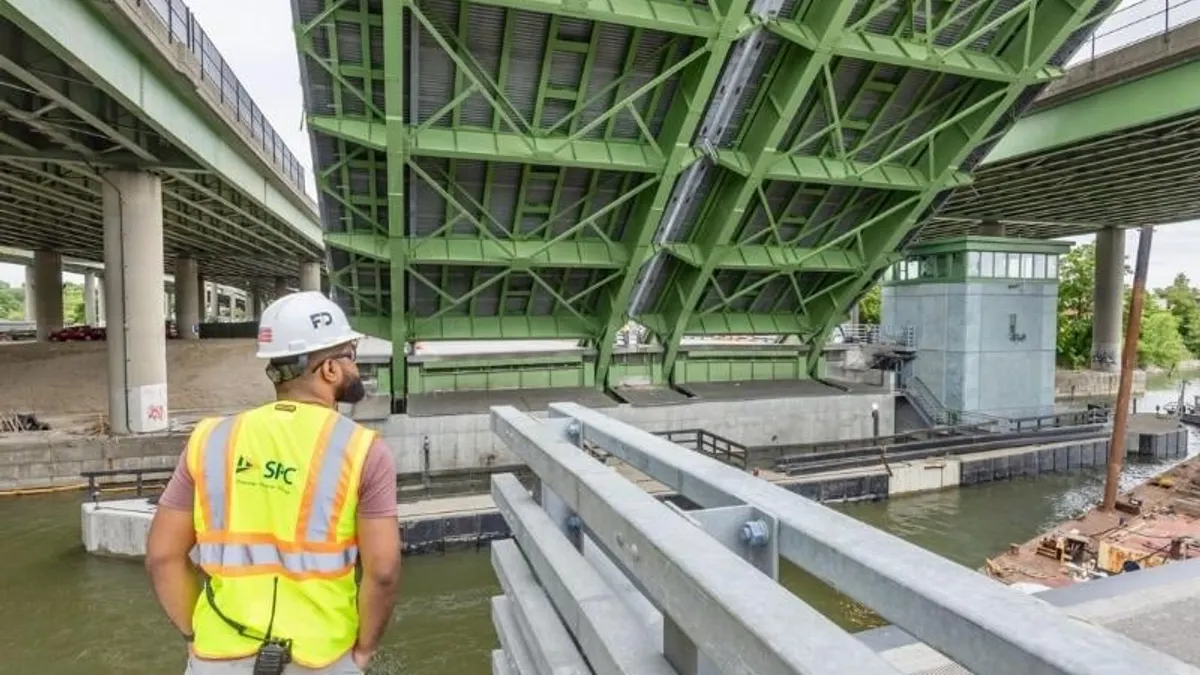This story is the first in a two-part series looking at the ramifications of a Biden win on the contractors and subcontractors that are helping to build the U.S.-Mexico border wall. Click here for Part 2.
During an interview this summer, Joe Biden, former vice president and Democratic challenger for president, told National Public Radio that his administration would not build “another foot of wall” along the U.S.-Mexico border if he is elected. Instead, he said, he would approach border security with high-tech alternatives and focus on the entry points “where all the bad stuff is happening.” He said he would not tear down the sections of walls that have already been built.
Such a halt would certainly be welcome by Democrats, activists and others who have opposed President Donald Trump’s vision of barriers that stretch almost the entire length of the country’s southern border, some near wildlife refuges and other environmentally sensitive areas.
Since Trump took office, according to the White House, his administration has overseen the construction of 370 miles of barriers. So far, Trump officials have identified $15 billion to build 738 miles of border wall, which has typically been steel bollard fencing, funded in part by Congress through the traditional appropriations process but mostly by reprogrammed money earmarked for military construction and counternarcotics programs.
| Companies approved to work on the border wall | |
|---|---|
| Barnard Construction | Bozeman, Montana |
| BFBC | Bozeman, Montana |
| Bristol Construction Services | Anchorage, Alaska |
| Burgos Group | Albuquerque, New Mexico |
| CJW JV | Santa Ana, California |
| Fisher Sand and Gravel | Dickinson, North Dakota |
| Gibraltar-Caddell JV | Montgomery, Alabama |
| Martin Bros. Construction | Sacramento, California |
| Posillico Civil/Coastal Environmental Group JV | Farmingdale, New York |
| Randy Kinder Excavating | Dexter, Missouri |
| SLS Ltd. | Galveston, Texas |
| Southwest Valley Constructors | Albuquerque, New Mexico |
| SWF Constructors | Omaha, Nebraska |
| Texas Sterling Construction | Houston |
| West Point Contractors | Tucson, Arizona |
The president was able to use Department of Defense funds under a national emergency declaration he issued in February 2019, an action that Democratic lawmakers have opposed and that is currently one of the border wall issues being argued in federal court. Thus far, the U.S. Supreme Court has prevented lower courts from stopping construction.
So, if Biden wins and if he follows through on his promise to halt border wall construction, what does that mean for the contractors and subcontractors who are working on those projects when the stop order comes?
Termination for convenience
Just as in the private sector, federal government contracts also include provisions for termination due to either default or convenience. The latter, said attorney Doug Tabeling with Smith, Currie & Hancock LLP in Atlanta, means the government can cancel a contract and walk away from a project for almost any reason.
For contractors that have just been awarded a project or just signed their contracts, he said, the termination would likely be a matter of paperwork. For contractors that have already done significant planning or are underway with construction, the termination process gets a little more complicated.
RELATED CONTENT: Should contractors that have provided services for the border wall be concerned about being blacklisted from state and local projects?
“Assuming that the contract contained the standard termination-for-convenience clause that’s in other federal construction contracts,” Tabeling said, “then the contracts get converted, more or less, into a cost-plus-a-reasonable-profit type agreement.”
So, he said, under the standard termination-for-convenience scenario, border wall contractors would submit a settlement proposal based on their costs, some of which could include:
- Labor and materials put in place.
- Stored material that cannot be returned.
- The difference between the purchase price for a piece of heavy equipment and the current value.
- Securing the project so that it does not pose a threat to the public or to the work completed.
In calculating profit for settlement purposes, he said, the government typically seeks to be fair, but contractors can forget about a big payoff. The contracting agency will likely want to see the original estimate in order to determine what profit margin the contractor expected to realize on the project and then the project books to see what margin they were actually achieving, Tabeling said. To increase the chance that a settlement proposal is accepted, he said, contractors should make sure to include backup documentation to substantiate their claims.
Given public sentiment about building a border wall and the potential for politics around the decision to stop work, contractors’ settlement proposals could be subject to more scrutiny than they normally would, he said.
Risks and rewards
The potential end to border wall construction is an example of the risk that contractors take when entering into an agreement for a project that is controversial or political in nature, said attorney Angela Styles with Akin Gump Strauss Hauer & Feld LLP in Washington, D.C.
For prime contractors faced with a termination for convenience, however, the greatest risk lies in the termination of their agreements with subcontractors, she said.
Savvy contractors, Styles said, will add language to their subcontracts mirroring the government’s right to terminate for convenience. If not, those contractors could find themselves owing their subcontractors the profit they expected to realize from the entire project, not just on the work performed up to the point of termination. That liability could also extend to sub-subcontractors as well.
Contractors who take action against the government to recover more than a termination for convenience would normally allow will face an uphill battle, Tabeling said. There are only a few, very narrow limits on the government’s ability to terminate for convenience.
“If [the termination] was done in bad faith,” Tabeling said, "it would mean [the government was] essentially maliciously trying to target a particular contractor and terminate their contract for some reason [that] had nothing to do with the work or the government's own priorities or the government's own needs.”
Financial implications
Attorneys for the Trump administration have spent a great deal of time in court for nearly four years defending border wall construction on a few fronts.
They have had great success thus far defending the project against environmentalists when the Department of Homeland Security regularly waives environmental laws like the Clean Water Act, the Clean Air Act and the National Environmental Policy Act in order to shave time off the schedule.
The Trump administration has had more difficulty making its case for diverting military funds in order to pay for the project, with Democratic lawmakers accusing the White House of attempting an end-run around Congress, which refused to fund construction in the amount the president demanded.
Federal courts have ruled that the situation at the border does not rise to the level of a national emergency and that the Trump administration cannot divert military funds to secure the area, but the favorable rulings from the U.S. Supreme Court has translated to work as usual on the wall projects.
If Biden wins, however, it doesn’t automatically mean that the money the administration diverted will go back into the DOD or Treasury, since the transfer of those funds is a new scenario, said Jordan Howard, director of the Associated General Contractors of America's federal and heavy construction division.
“It's not new that the government stops, changes its mind or cancels a project,” Howard said. “That happens. But it is new with reprogramming [on this scale.]”
The possibilities, he said, include using the money for electronic surveillance and monitoring systems instead, seeing a big chunk of those funds go toward work already performed and termination fees to contractors or returning it to the budget.
“It’s complicated,” Howard said.




















